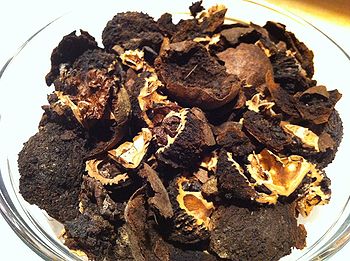Black Walnut
From Wikiwel
Other Names: Carya, Carya basilike, Carya persica, Green Black Walnut, Green Walnut, Juglans nigra, Jupiter's Nuts, Nogal Americano, Nogal Negro, Nogueira-preta, Noix, Noix de Jupiter, Noix de Perse, Noix Verte, Noyer d’Amérique, Noyer Noir, Noyer Noir Américain, Nux persica, Nux regia, Schwarze Walnuss, Walnoot, Walnut, blacknut
Black walnut is a tree. People use the outer covering of the nut (the hull) to make medicine.
Black walnut is a tree. People use the outer covering of the nut (the hull) to make medicine.
Special Precautions of Black Walnut
- There are some toxicity issues concerning the juglone content in black walnut extract. For one thing, this substance is known to be toxic in animals. There is also sufficient evidence to suggest that juglone may produce mutagenic activity, meaning that it can alter the genetic substance in cells.
- Black walnut might be unsafe when applied to the skin. It contains a chemical called juglone that might cause tongue or lip cancer, especially if applied daily.
- Pregnancy and breast-feeding: Don’t apply black walnut to the skin if you are pregnant or breast-feeding. This topical use might be unsafe. It’s also best to avoid oral use. Not enough is known about the safety of taking black walnut by mouth during pregnancy or breast-feeding.
- Medications taken by mouth (Oral drugs) interacts with Black Walnut.
- It's also possible that certain individuals may experience an allergic reaction to black walnut extract, especially if there is a sensitivity to other nuts.
Benefits and uses of Black Walnut are
Black walnut contains high concentrations of chemicals called tannins, which can reduce pain and swelling and dry up body fluids such as mucous.
- Leukemia : scientists found several animal studies supporting the use of black walnut's active compound, juglone, in treating various types of cancer. Juglone reduced the occurance of tumors and of tumor growth and killed human leukemia cells in vitro. However, juglone also promoted skin cancer, allergies and inflammation when applied topically. Researchers concluded that juglone may be an anticancer compound in some forms of cancer, but its usefulness is limited by its high toxicity.
- Diphtheria.
- Syphilis.
- Intestinal worms.
- Use as a gargle.
- Chinese Medicine : In Chinese medicine, black walnut extract is used to treat a variety of ailments, including asthma, constipation, lumbago and impotence. The extract is also considered a blood purifier and is used to treat various gastrointestinal disorders.
- Ayurvedic Medicine : In India, black walnut extract is used to treat rheumatism, colic, diarrhea and dysentery. It is also used to expel intestinal parasites in humans, sometimes in combination with other herbal extracts. The extract is also believed to provide aphrodisiac effects.
- Topical Uses : Black walnut extract is added to topical lotions and creams intended to treat a variety of skin conditions, such as eczema, psoriasis, and hemorrhoids, as well as herpes infections and skin wounds.
- Black walnut extract contains a variety of active compounds, most notably tannins and an agent called juglone. The tannins are responsible for providing astringent properties, while juglone is antifungal. These qualities make the extract suitable for treating inflammatory conditions of the gastrointestinal tract.
- Black walnut bark is a perfect complement to cascara for restoring your colon's health.
- Black walnut extract is also believed to provide antioxidant properties because of the presence of several flavonoids, such as quercetin.
- In the future, black walnut extract may play a role in treating and preventing Alzheimer's disease. Researchers have discovered that black walnut contains an anti-amyloidogenic compound that appears to significantly inhibit the protein responsible for amyloid plaque formation in the brains of Alzheimer's patients. However, more research is needed to confirm this effect.
